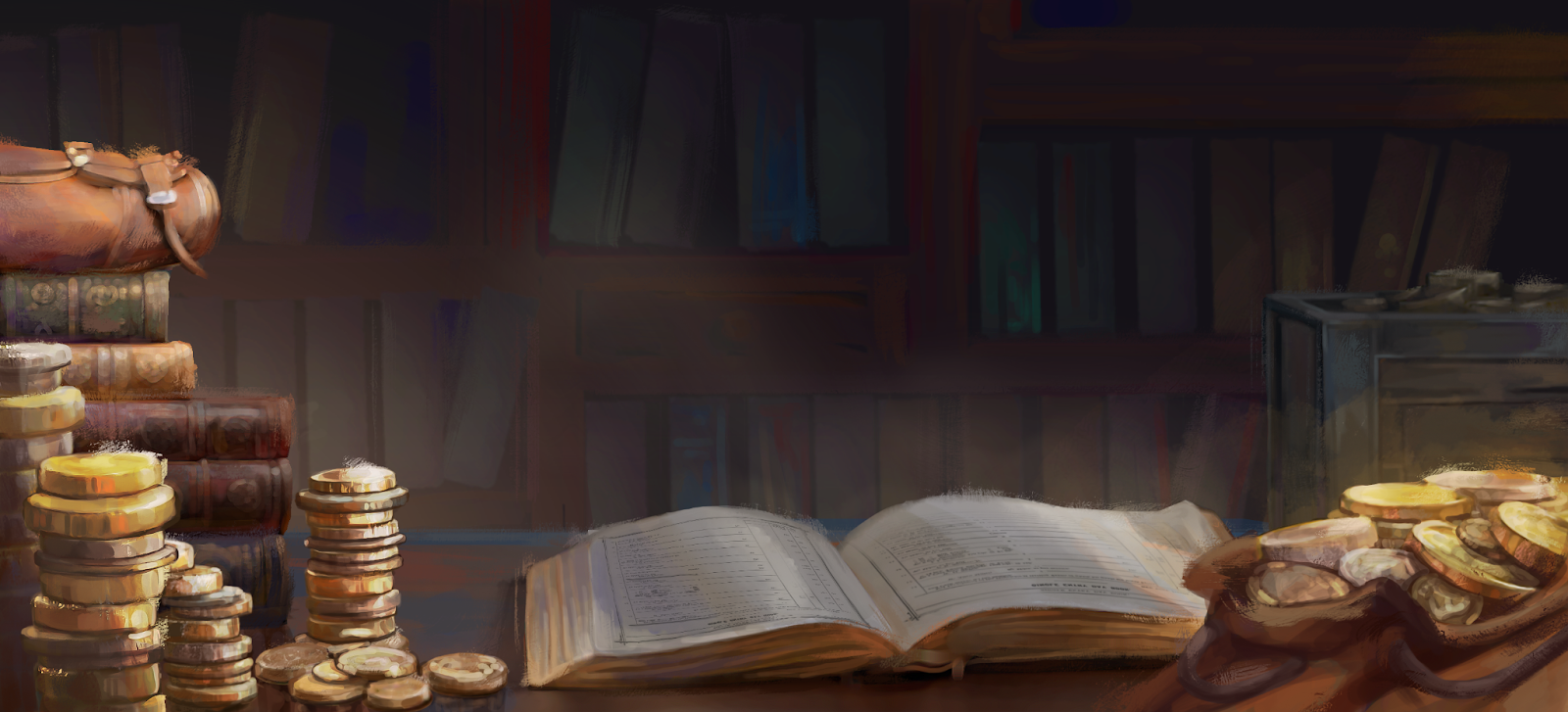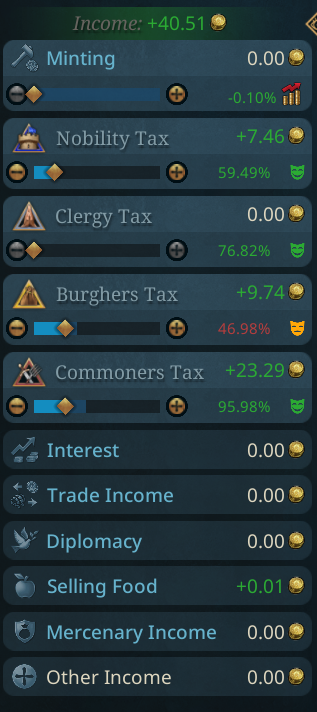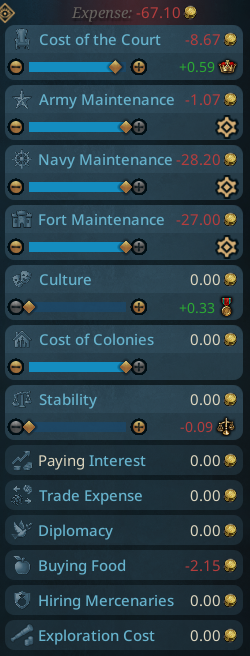Welcome to the seventh edition of Tinto Talks, where we talk about really super secret stuff, that is hidden behind the code name of ‘Project Caesar’.
Today we’ll look into what makes up the economy in Project Caesar. Obviously, we’ll go into much more detail on some of these aspects in later Tinto Talks. Right now though, we’ll go through the incomes and expenses of a country in the game.
Every month you have running incomes and expenses that need to be balanced, and if your balance is positive, your gold is increased and you can use that gold to invest in other things.
And with balancing incomes and expenses, of course there are sliders. Having some buttons for just a few possible options for taxes or expenses, like in Imperator, is not really fitting for a GSG with deep economical gameplay.

Incomes
If we start with income, you have trade-related incomes, which is a system we will delve deep into in early May, as well as diplomatically related income. You also gain gold from provinces (not locations) that sell surplus food they can not store in their local market. Neither of these you directly control with any slider though.
The bulk of most countries' income will come from taxes though, and taxes in Project Caesar are really different than before. First of all, every estate has a possible tax base, a concept we will delve into much more detail next week. This you can attempt tax from them, but every estate has a maximum tax you can take from them, which depends on your laws and their privileges, and how much power they have in your country. The higher the tax you take from them, the lower their satisfaction equilibrium becomes. Some examples of tax affecting things include the Catholic religion which limits the taxes on Clergy, and also the ‘Auxilium et Consilium’ estate privilege for the nobles, which reduces the tax they pay.
Finally, for something that has existed in some older of our games, we have minting. Now what is that you may ask? Minting is the possibility to get more money by printing more coins. It just has the slight drawback of increasing your inflation the more you do it.

Here we have the possibility to tax the commoners a fair bit more…
Expenses
We all do love gaining gold, but sadly we also have to spend it, and while we can reduce some of the spending, we can not completely avoid all of it.
First of all, we have the Cost of the Court. This is something that is directly correlated to the economic base of your country, and if you spend less gold than expected, your legitimacy, or equivalent applicable government power, will decrease over time, and the more you spend, the more legitimacy can increase. There are advances, laws, and other things that impact how much you need to spend here.
Then we have the cost for your standing army and navy, where spending less reduces their fighting capability. This is nothing new to our GSG games, so I am not sure why I need to mention this here.
Fort Maintenance is another common economic expense from our games, which is here as well. If you don’t pay, garrisons don’t tend to stick around.
Culture, this is an entirely new concept, which will become available in the Age of Renaissance, where you can invest money to get [TO BE TALKED ABOUT LATER], while also impacting your prestige.
You can also decide how much you wish to spend on your colonial charters, which is a new system we will talk about later this year.
Finally, the last thing you can impact with a slider is your investment in stability. The cost for how much your investments are needed depends on the size of your country, with different laws and societal values impacting it as well. Stability in itself ranges from +100 to -100, and will decay towards 0 on its own. There are two other ways to impact your stability gain, besides investing gold as mentioned here. One of them relates to the cabinet system, but another is a more long-term impact from how your country is built up, as it is based upon how many clergy pops you have of your state religion compared to the total population.
There are other expenses as you can see below, but one important thing to mention is that provinces that lack food will try to buy it from the local market.

Maybe maybe we should cut down on our fleet, and maybe we don’t need ALL those forts. Our standing army of 200 brave footmen is enough!
Next week we’ll talk more in depth about how the tax base functions, how the food system works, and some other related issues.
Today we’ll look into what makes up the economy in Project Caesar. Obviously, we’ll go into much more detail on some of these aspects in later Tinto Talks. Right now though, we’ll go through the incomes and expenses of a country in the game.
Every month you have running incomes and expenses that need to be balanced, and if your balance is positive, your gold is increased and you can use that gold to invest in other things.
And with balancing incomes and expenses, of course there are sliders. Having some buttons for just a few possible options for taxes or expenses, like in Imperator, is not really fitting for a GSG with deep economical gameplay.
Incomes
If we start with income, you have trade-related incomes, which is a system we will delve deep into in early May, as well as diplomatically related income. You also gain gold from provinces (not locations) that sell surplus food they can not store in their local market. Neither of these you directly control with any slider though.
The bulk of most countries' income will come from taxes though, and taxes in Project Caesar are really different than before. First of all, every estate has a possible tax base, a concept we will delve into much more detail next week. This you can attempt tax from them, but every estate has a maximum tax you can take from them, which depends on your laws and their privileges, and how much power they have in your country. The higher the tax you take from them, the lower their satisfaction equilibrium becomes. Some examples of tax affecting things include the Catholic religion which limits the taxes on Clergy, and also the ‘Auxilium et Consilium’ estate privilege for the nobles, which reduces the tax they pay.
Finally, for something that has existed in some older of our games, we have minting. Now what is that you may ask? Minting is the possibility to get more money by printing more coins. It just has the slight drawback of increasing your inflation the more you do it.
Here we have the possibility to tax the commoners a fair bit more…
Expenses
We all do love gaining gold, but sadly we also have to spend it, and while we can reduce some of the spending, we can not completely avoid all of it.
First of all, we have the Cost of the Court. This is something that is directly correlated to the economic base of your country, and if you spend less gold than expected, your legitimacy, or equivalent applicable government power, will decrease over time, and the more you spend, the more legitimacy can increase. There are advances, laws, and other things that impact how much you need to spend here.
Then we have the cost for your standing army and navy, where spending less reduces their fighting capability. This is nothing new to our GSG games, so I am not sure why I need to mention this here.
Fort Maintenance is another common economic expense from our games, which is here as well. If you don’t pay, garrisons don’t tend to stick around.
Culture, this is an entirely new concept, which will become available in the Age of Renaissance, where you can invest money to get [TO BE TALKED ABOUT LATER], while also impacting your prestige.
You can also decide how much you wish to spend on your colonial charters, which is a new system we will talk about later this year.
Finally, the last thing you can impact with a slider is your investment in stability. The cost for how much your investments are needed depends on the size of your country, with different laws and societal values impacting it as well. Stability in itself ranges from +100 to -100, and will decay towards 0 on its own. There are two other ways to impact your stability gain, besides investing gold as mentioned here. One of them relates to the cabinet system, but another is a more long-term impact from how your country is built up, as it is based upon how many clergy pops you have of your state religion compared to the total population.
There are other expenses as you can see below, but one important thing to mention is that provinces that lack food will try to buy it from the local market.
Maybe maybe we should cut down on our fleet, and maybe we don’t need ALL those forts. Our standing army of 200 brave footmen is enough!
Next week we’ll talk more in depth about how the tax base functions, how the food system works, and some other related issues.




